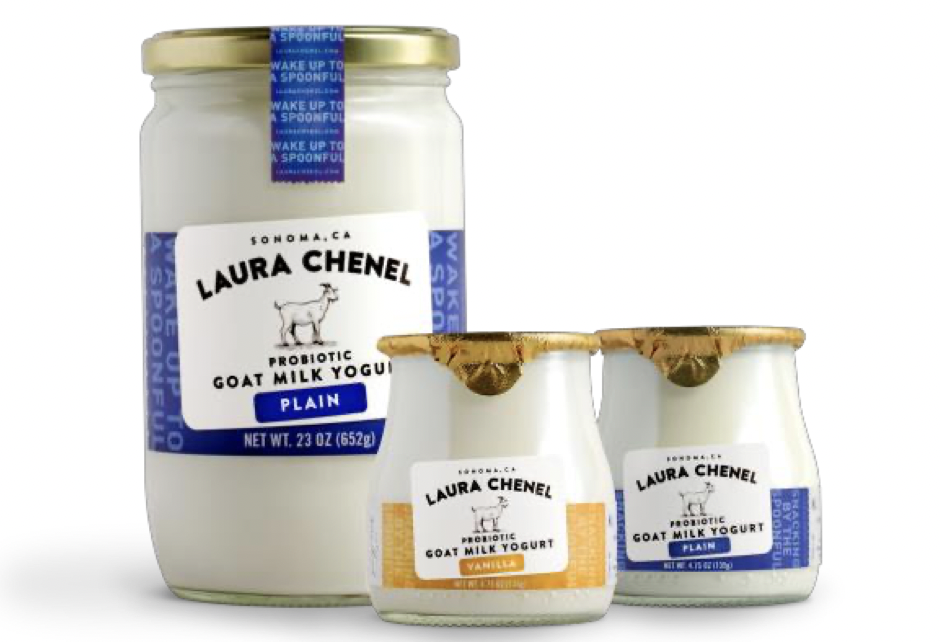Consumer demand for goat milk products has been on the rise, and so has the cost of doing business in that segment of the industry.
As an example, one maker of goat milk yogurt, Sonoma, California-based Laura Chenel, recently said it was discontinuing its Laura Chenel Probiotic Goat Yogurt because of high input costs. The company issued a letter to customers explaining that its last shipment was scheduled to go out on Sept. 30.
“We are committed to bringing good, wholesome food to home cooks and chefs across the nation,” said BJ Frank, national sales director, Laura Chenel, in a letter to its customers. “With this in mind, for the last few years, we’ve made delicious, award-winning, gut-friendly probiotic goat yogurt that was well received by our consumers. However, with the recent rising costs of milk and other materials, we can no longer produce this product at an affordable price.”
The company said that other than freeing up resources, the discontinuation would not have any impact on any of its other product lines at Laura Chenel or within its family of brands, St. Benoiot Creamery and Marin French Cheese Co.
Laura Chenel, which has been a pioneer in the goat milk cheese industry for decades, introduced the probiotic-enriched goat milk yogurt in 2019, and the next year announced expanded distribution in West Coast specialty retailers and supermarkets such as Whole Foods Market, Mollie Stone’s, and New Seasons. In 2021, the product was named Yogurt of the Year by the Mindful Awards, which seek to recognize “the best in transparent, fair, natural, organic, sustainable, healthy and delicious products.”
Laura Chenel also won a 2022 sofi Award from the Specialty Food Association for its Everything Bagel Fresh Goat Cheese, for best new product in the Cheese — Non-Cow Milk, Mixed Milk category.
The discontinuation of the goat milk yogurt comes as consumers increasingly gravitate toward goat milk products, as they have gained a reputation for their health benefits. Consumers may also be attracted to the fact that many goat cheese products are produced by artisanal makers using milk from small, family-owned farms.
Mike Koch, president of the American Cheese Society and the president and co-founder of Accident, Maryland-based FireFly Farms, a maker of goat milk cheeses, said he’s seen increasing consumer demand for goat milk products. Sales of goat cheeses appear to be rising across the industry, he said, based on what he’s heard from other ACS members.
FireFly Farms in the past 24 months has expanded its sourcing for goat milk from eight or nine farms two years ago to 17 different farms today in order to keep up with rising demand, Koch said.
He cited rising costs across a range of expenses, however, from packaging to fuel and labor. In addition, supply chain irregularities have forced companies, including FireFly Farms, to stock up on inventories, which reduces cash flow and adds to the inventory costs on the balance sheet.
“All of these price increases are not only happening in the cheesemakers’ environment, they are happening in the farmers’ environment,” said Koch. “So, there is certainly upward pressure on milk prices, and that is, of course, our primary supply input.”
For example, one goat farmer said feed costs have risen 40 percent in the past year, according to a recent report by PBS Wisconsin. The report described the rising input costs and increasing consumer demand for goat milk that drove the recent merger of Wisconsin’s Chilton Dairy and Drumlin Dairy with LaClare Family Creamery, a large maker of high-quality goat cheese made from locally sourced goat milk.
Input costs can also vary by market, Koch said, noting that high land costs in some areas could limit the expansion of goat farms, for example, making goats’ milk more expensive and harder to procure locally.
Throughout the industry, he said, cheese makers are rethinking their pricing amid the widespread inflationary pressures.
“One of the biggest items on my agenda for Q4 is a new cost analysis,” he said. “We know it’s time to do that analysis, and if necessary, pass along a price increase to our customers.”
Many cheese makers have been implementing price increases for the past several months, he said, although FireFly Farms has held off on doing so.
“We have been using our capital for bulk purchasing of inputs to reduce the per-unit cost of those inputs, and trying to act in ways to preserve our margin without increasing prices, but those days are over,” said Koch. “We will have to evaluate and implement a price increase at some point.”
Related: Cheers to Cheese and Beer; Food Prices Remain High, Inflation Slows.

